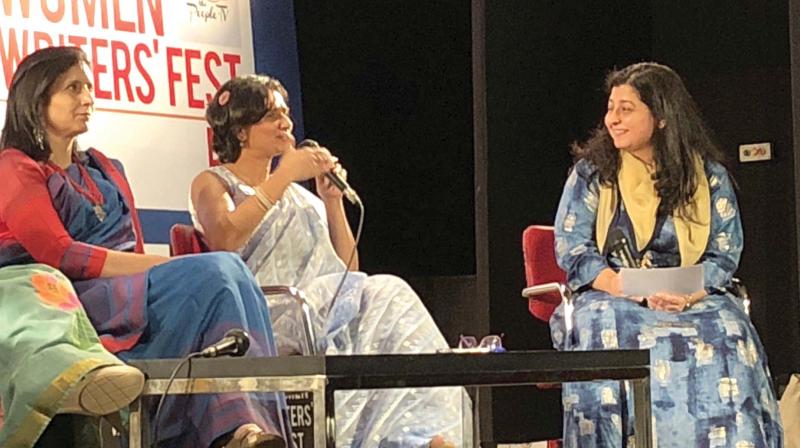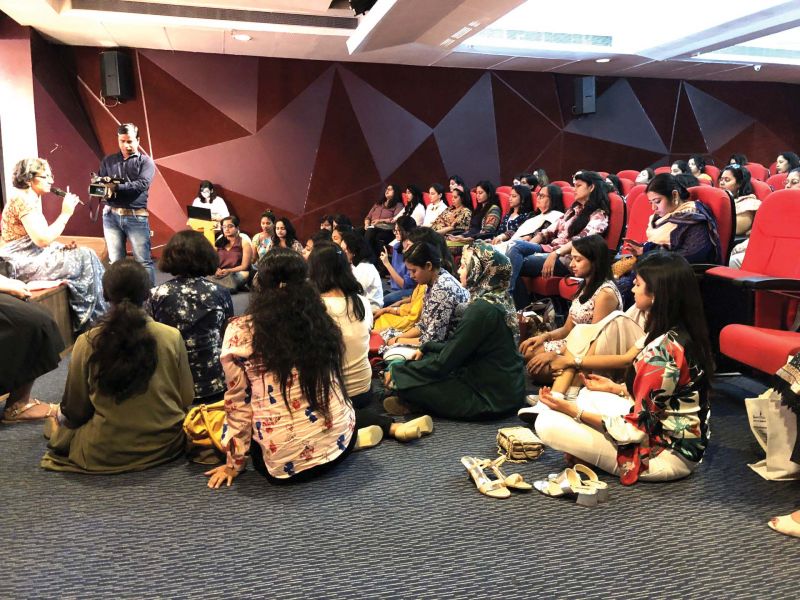Women writers' seek a room of one's own'
This is in terms of diversity in gender and also that of the topics that are written about by women.

On September 1, Shaili and her co-curator Kiran Manral will arrive in Bengaluru for the second editon of the Women Writers’ Festival. Their reach has improved the second time round, the festival will make six stops through the country in 2018. The first question that springs to mind: Doesn’t a festival solely for women writers isolate them even further? One doesn’t have to look too far for the answer. As literature festivals gain ground in India, events mushrooming across the country all vying to outdo each other with controversy, politics, the glamour of Bollywood and oh yes, writers, there’s little room for the rest. “We’re looking at the topics you’re not likely to hear at a literary festival today,” says Kiran Manral.
Indeed you aren’t. This year will see the likes of Anuja Chauhan, Amruta Dongrey, Jahnavi Barua, Shinie Antony, Shalini Srinivasan and Milan Vohra, taking on a number of diverse topics, from rom coms to the life of a female blogger. Representation of diversity is key, explains Shaili. “This is in terms of diversity in gender and also that of the topics that are written about by women.”
Women’s writing in India, the sort that the enters the mainstream, is largely centered around politics. Whether this comes from an innate sense of defiance in the face of doubt and resistance or the need to assert the female voice in these arenas, the depth of the female experience seems to be paying the price. “We don’t talk about subjects like erotica, poetry, crime, thrillers. There’s a lot to look at.” Encapsulating this into a single day might seem Herculean but it’s a start, in fact, the Women Writers’ Festival, India, is part of only three in the world. “This is a space for women writers to speak out and be heard.
Here, the spotlight finds itself on women’s writing and on writers who talk about women. “The latter is a small percentage,” she admits. Still, there is an ocean of writing by women that needs to be navigated, in a world where the literary scene is still dominated by men, feels, Shaili. “If there were men writing about women’s issues, by all means, we will include them here.” The bestselling author, Amish Tripathy made an appearance, in fact, at one of their monthly Book Club meetings to discuss the character of Sita. “We’re not discrminating against women,” she says, gingerly, “but we do feel like there is a need for women writers in themselves.”

Writing, whether it spans longform, books, fiction or non fiction, remains male-dominated. This manifests in many ways, whether it is the amount of marketing the books are given or the number of conversations that centre around them. Unless, of course, they deal directly with women’s issues. “You see an anthology of stories, most of the writers will be men.” With little research conducted across the country, it remains anecdotal. However, out of the 64 writers who have been awarded the Sahitya Akademi Award since it was conceptualised in 1954, only seven are women.
“Look at in terms of marketing and publicity, the top three authors in the country are men, even today,” says Shaili. “We can have female equivalents of all these authors but we need them to be celebrated, too. There are enough writers among women!” The narrowing of the public preference for politics has clouded out the many other things that find themselves in the works of women writers. “There are those who write about business and books that deal with being a woman blogger. These books sell but who is talking about them!”
The Women Writers Festival began in 2017 with five editions. After Bengaluru this year, they leave to Pune and then Hyderabad. The idea itself, however, came about in 2015.
Shaili, the founder of the website SheThePeople, a platform for women writers, found much good work and effort existed already in what she calls the ‘non-vanity side of things.” Feminism as a political statement is making itself heard, albeit at the cost of so much else. As Shalini and Kiran scouted for women writers to feature on the website, they found a surprising number who confessed to having written books that they don’t know how to publish. “They talked about how they do all this amazing research, with publishers, but still struggled with sales.” How do you make a blog, how do you put your book out there, how do you make yourself known? The questions that plague writers irrespective of gender will be brought forth in a safe, non-judgmental space.
“There’s a lot of back and forth, we have discussions and people are free to agree or disagree.” This year at Fandom, the Women Writers’ Festial will deal with the realities of writing both fiction and non fiction, the prevalence of
children’s litera ture and the rise of book clubs, both virtual and otherwise.
“Women are also sometimes more comfortable with other women,” Shaili remarks.
More than anything, it’s a place to talk about the things we deal with everyday, where being a woman doesn’t have to be a political statement and the parameters of gender identity don’t cloud every aspect of our lives.

